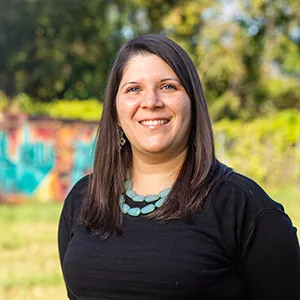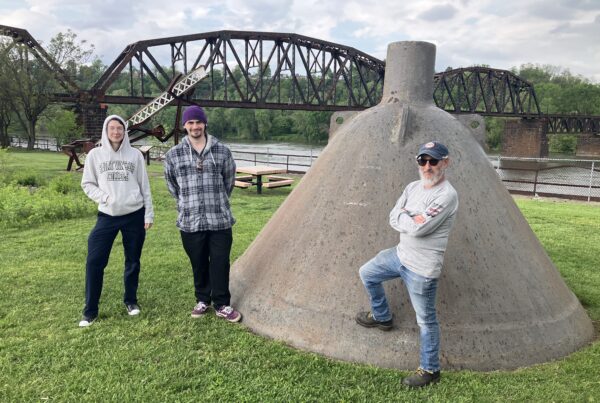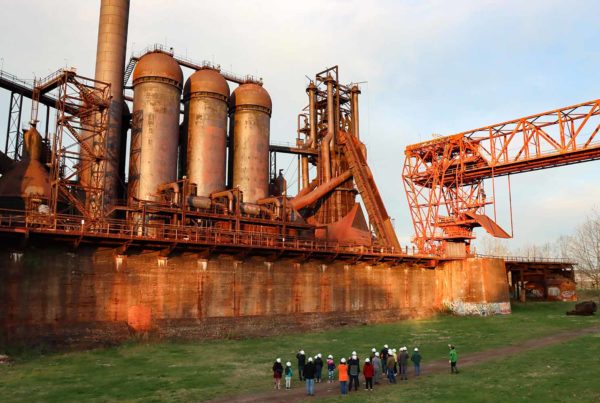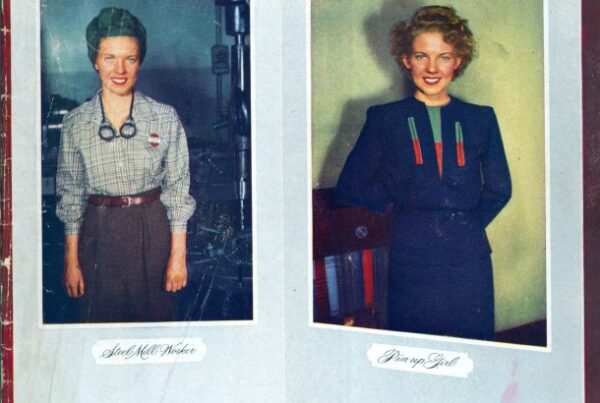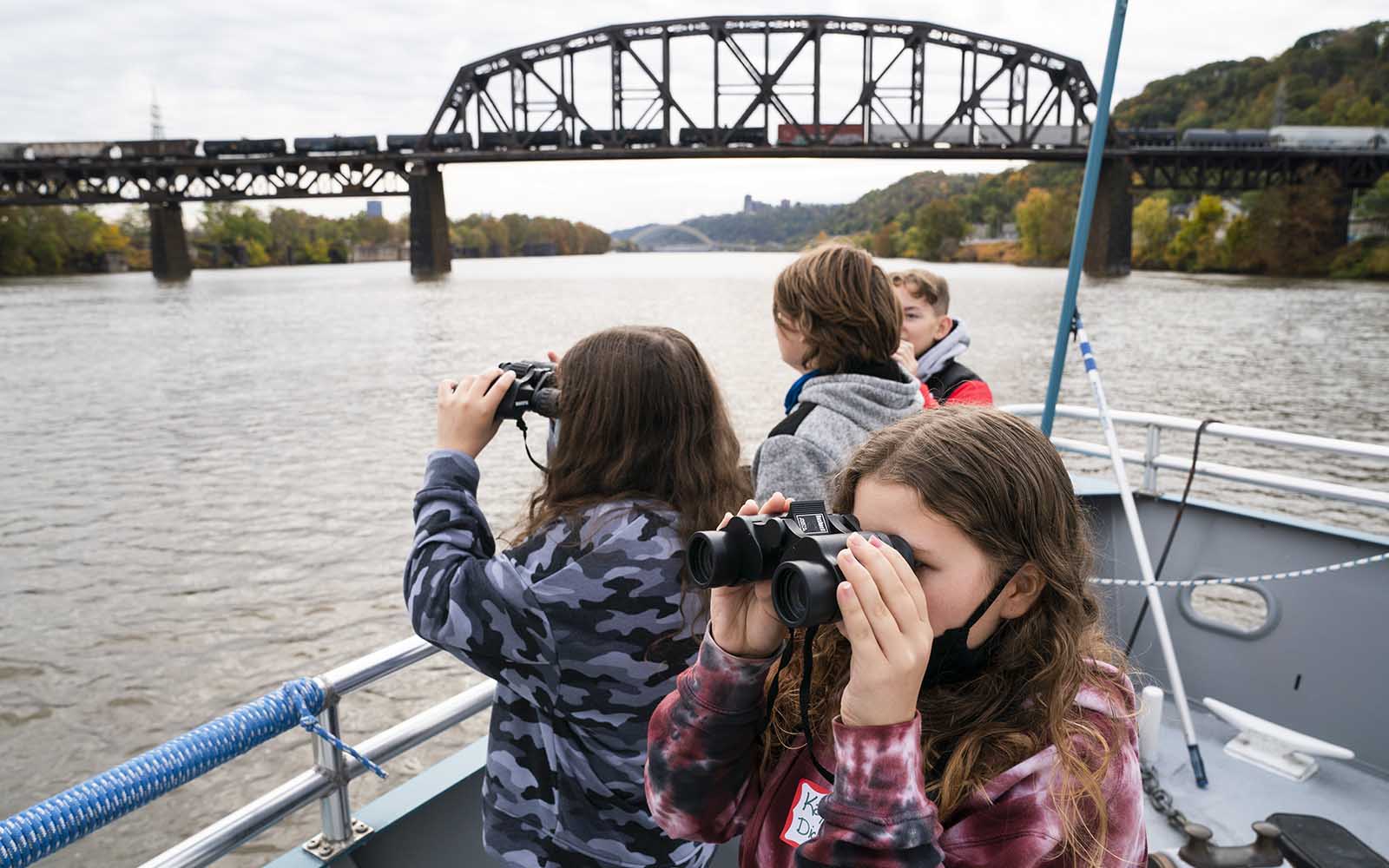
By Gita Michulka, Contributing Writer | Image: Students from Carmichaels Middle / High School look for birds during the Environmental Science on the Three Rivers program. Photo by Jason Cohn.
Exploring “Environmental Science on the Three Rivers”
How healthy are Pittsburgh’s three rivers?
With the help of some water and mud samples and the plankton who live in them, a group of middle school students from the Greater Latrobe School District set out to answer that question as they boarded the Explorer riverboat for Rivers of Steel’s Environmental Science on the Three Rivers STEM program.
“Anytime you can get the kids outside, get them doing hands-on experiments—it’s great,” says Patrick Roberts, the science teacher at Greater Latrobe Junior High School. “Especially after this past year, with so much screen time, having this opportunity is really special.”
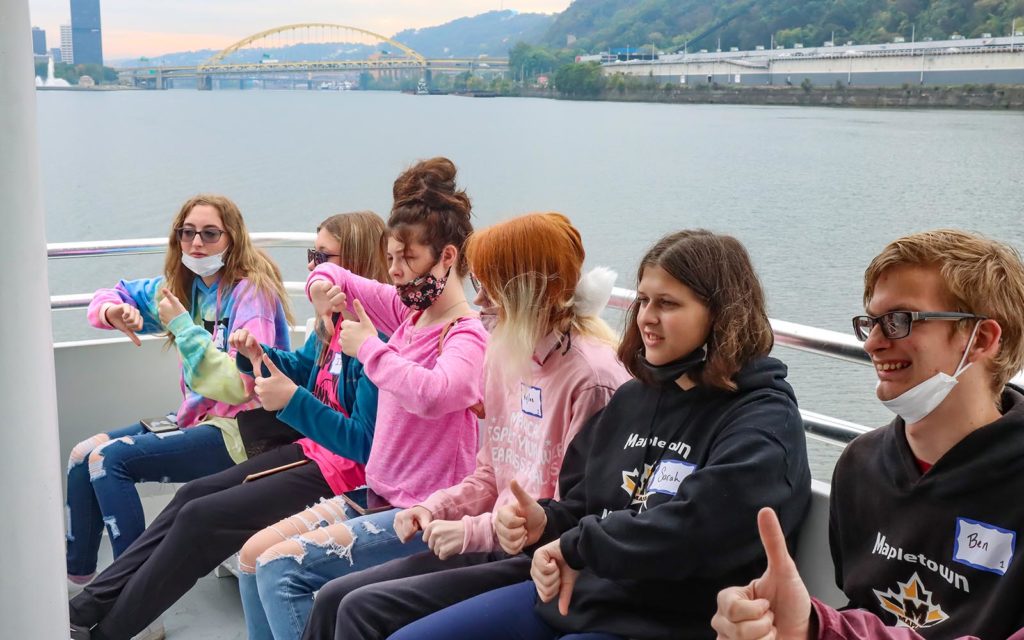
Students from Mapletown Junior / Senior High School present their hypothesis by voting thumbs up, thumbs down, or a combination thereof. October 15, 2021.
Once on board, the students are asked to give either two thumbs up, two thumbs down, or a combination of the two to indicate if they think the rivers are healthy enough to support life. There is a mixed reaction at first, followed by immediate interest in the activities they will be using to support or disprove their hypothesis. As the boat sails down a portion each of the Allegheny, Monongahela, and Ohio rivers, the students are split into three groups to rotate through different stations. In each, they get a hands-on approach to thinking like a scientist.
Suzi Bloom, director of education for Rivers of Steel, leads the program, along with seven part-time instructors. Each one has a background in environmental science in one form or another; Bloom holds a master’s degree in Parks and Resource Management with an emphasis on environmental education. During the program, one instructor is paired with every ten students, allowing for truly collaborative interactions within the groups.
In the three-hour version of the program, students rotate through three stations: Plankton, Water Chemistry, and Aquatic Macroinvertebrates. If a school chooses the four-hour program, two additional stations cover Birds and Fish and the River Continuum. There are discussions on watersheds, tributary rivers, and river basins. The students conduct a review of a topographic map for the area near the rivers and discuss rainfall and water runoff and the diversity of life found in the rivers.
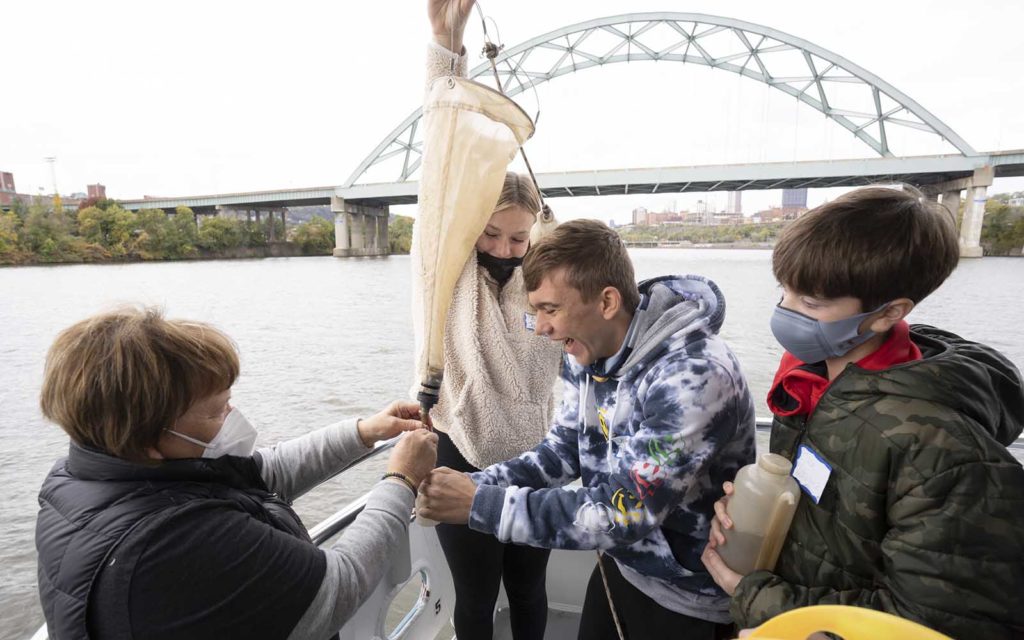
Students from Carmichaels Area Middle / High School filter water through a planton tow to collect samples. Photo by Jason Cohn.
And then the fun begins. Students help cast a plankton tow into the river and then look at samples of the water they brought up under their microscopes, where they discover an array of plankton zooming around in the water. There is immediate excitement as their slides come into focus and they begin comparing what they find. Water samples are also tested for pH and oxygen levels, as well as turbidity—the measure of clarity of a liquid. At a stop on the Allegheny River, students assist with collecting a mud sample from the river bottom using Petite Ponar sieve buckets. These samples hold macroinvertebrates—slightly larger critters than plankton, with shells and exoskeletons. As one student noted, with pure joy, as she carried a cup of mud to her station: “It’s disgusting, but cool!”
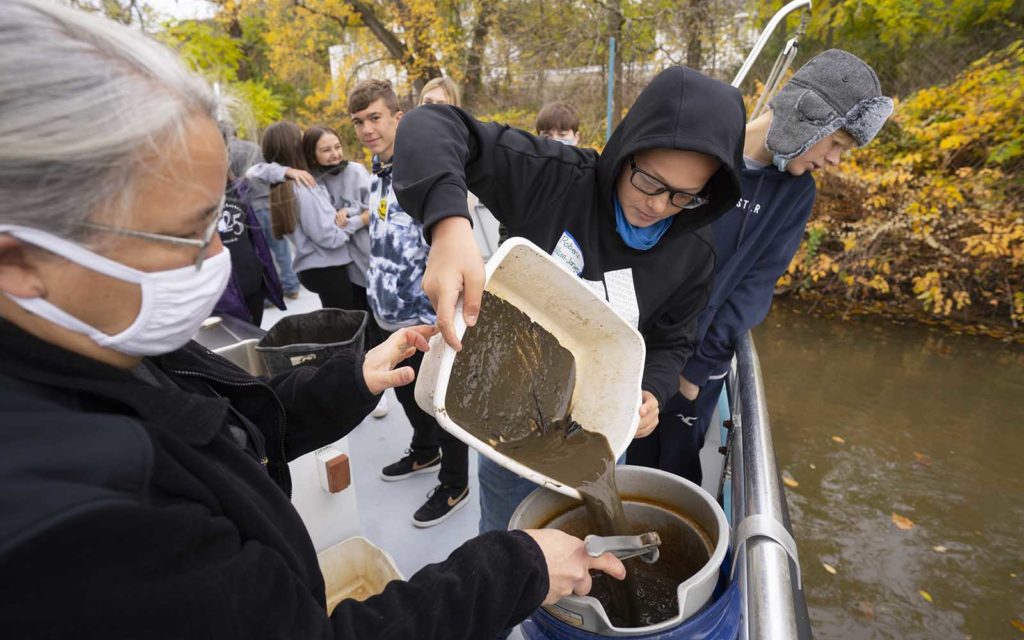
Large debris is filtered from the mud samples gathered using Petite Ponar.
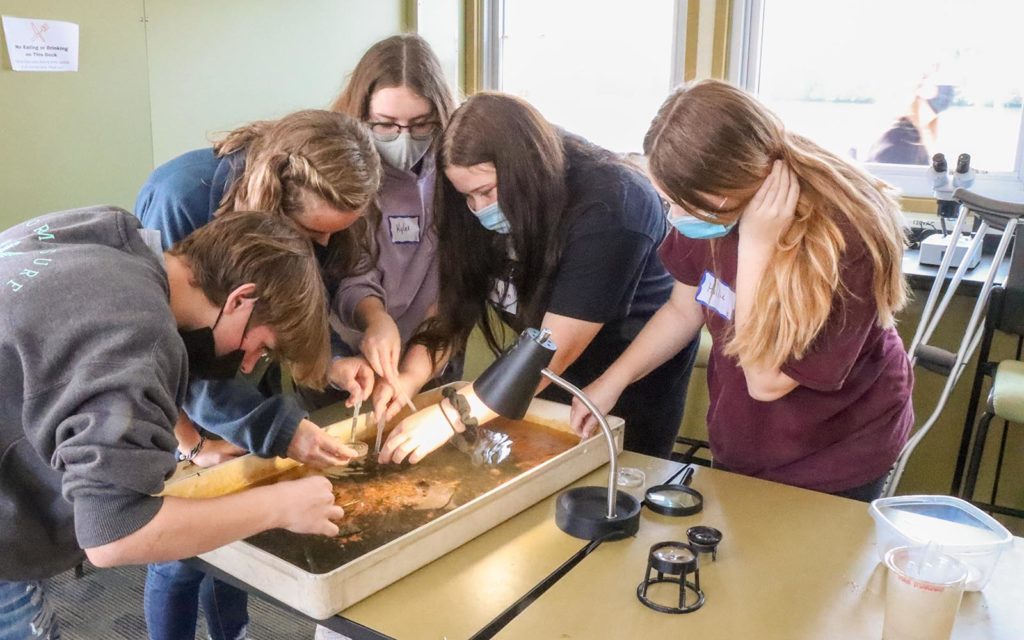
Students from Mapletown gather samples of aquatic macroinvertebrates.
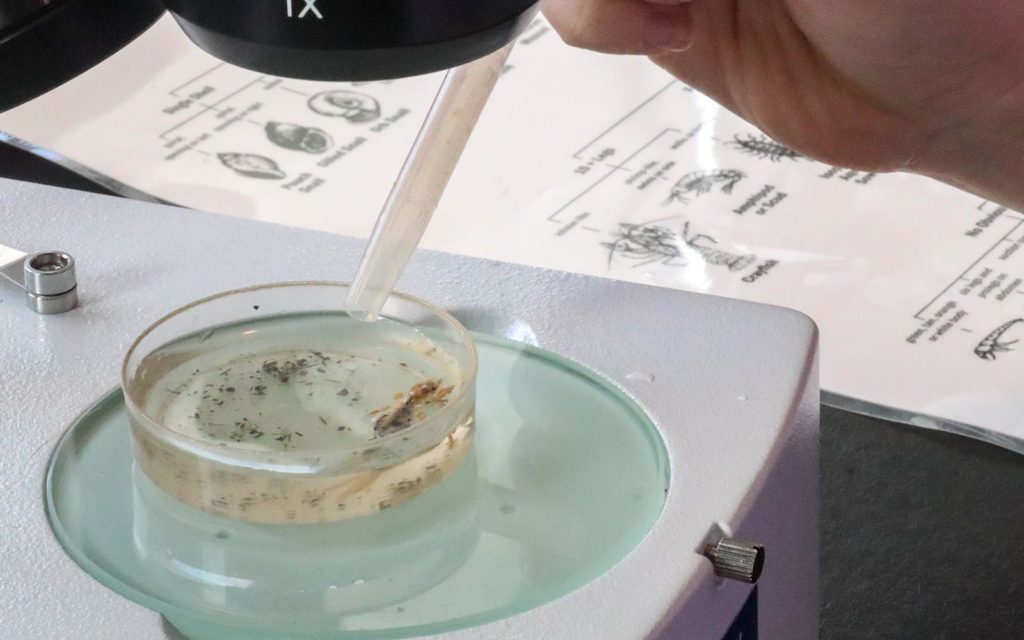
Macroinvertebrates are sourced from muddy water and examined to determine the identity.
Roberts, who holds degrees in biology and science education, is also a research scientist for the Western Pennsylvania Conservancy. He has used the creek that runs behind their school for some interactive lessons but appreciates the opportunity to bring his students directly to the rivers as an expansion of their curriculum. In particular, he noted the quality of instruction the Environmental Science program offers and the enthusiasm of the teachers as they engage the kids in the scientific method and research process.
Latrobe is one of three schools who were able to participate thanks in part to a corporate sponsorship by Peoples Gas that allowed for waived fees for up to 100 students. Other schools who received a scholarship include Mapletown Junior / Senior High School, located near Greensboro, in Greene County, and Carmichaels Area Middle / High School, also located in Greene County about an hour south of Pittsburgh.
“This scholarship program has been wonderful,” Roberts adds. “Because the students’ fees were waived, we could afford the transportation needed to get them here. That wouldn’t have happened without that help.”
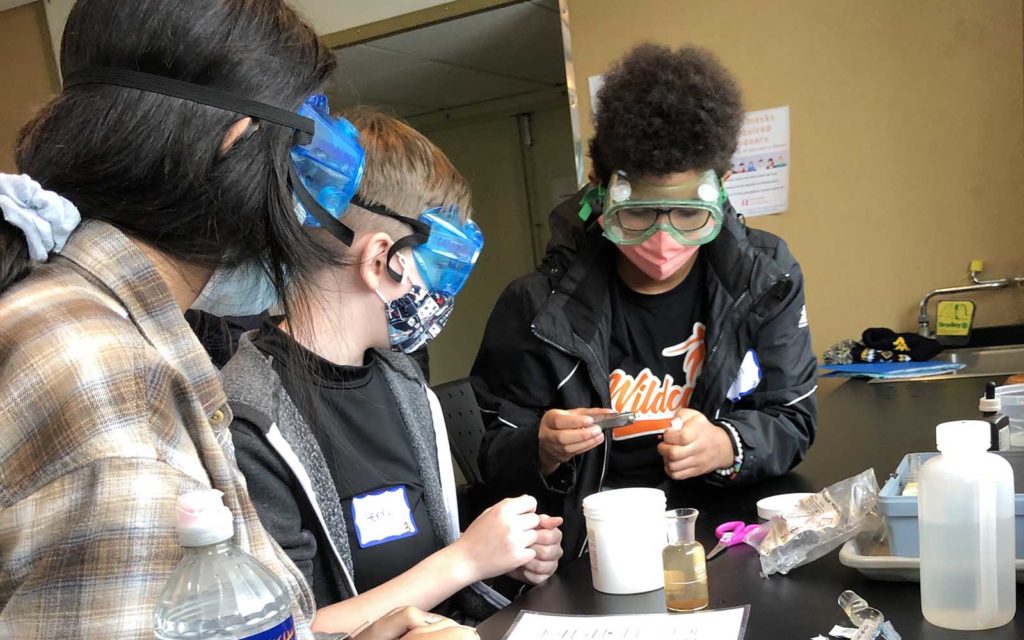
Greater Latrobe students use chemistry to study the river water.
This fall 395 students from 11 separate districts attended an Environmental Science on the Three Rivers session. The ability to waive fees for their students presented an opportunity for Greater Latrobe, Mapletown, and Carmichaels to move toward a “return to normal” as the schools began allowing field trips for the first time in two years.
Additionally, all proceeds from public sightseeing tours and from private charters on the Explorer help to underwrite Rivers of Steel’s STEM-based education programs for students throughout southwestern Pennsylvania.
Explorer, which is a “floating lab,” as Bloom notes, has long hosted educational programming for students. The Environmental Science program is open to any school interested in participating, but the help of scholarship funds allows outlying districts the ability to bring their students to the city. “The impact of a donation from just one sponsor has been incredible. Think of how many more kids we could reach if just one or two other sponsors added to that.”
After the Mapletown students returned to their school, teacher Amber Burkett asked the students what they thought of the trip. A lot of students commented on how fun it was to spend the morning “digging in the mud” and using science equipment, but one reply in particular really summed up the effect of the program—“I learned that we can all make an impact. Learning about the aquatic life was fascinating and meaningful to me.”
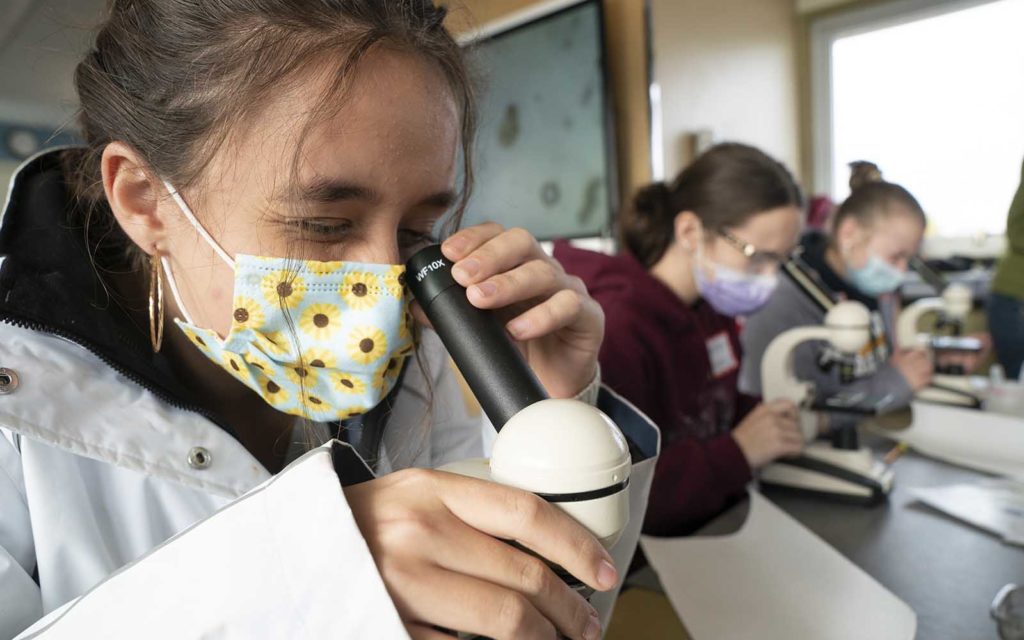
Carmichaels students use microscopes to determine what types of planton they sourced from the river. Photo by Jason Cohn.
Participating in the Environmental Sciences program also has an added bonus for Mapletown and Carmichaels students. Both schools participate in the Pennsylvania Envirothon and NCF-Envirothon competitions, where students compete in field testing, using their knowledge in five topic areas, including: Soils and Land Use, Aquatic Ecology, Forestry, Wildlife, and Environmental Issues. While working through the five stations on Explorer, the students are able to practice for the Aquatic Ecology and Environmental Issues topics. In 2021, Carmichaels students won first through third place in the competition and in 2019 they placed third in an international Envirothon competition!
For more information on Environmental Science on the Three Rivers visit, contact Suzi Bloom at sbloom@riversofsteel.com.
About Rivers of Steel Education
Rivers of Steel Education offers unique, inquiry-based opportunities for students to discover how southwestern Pennsylvania’s natural resources have shaped our industrial past and cultural heritage—and how our environment today impacts our region’s future.
Blending history with hands-on STEM exploration, Rivers of Steel’s education programs guide students in understanding the complex nature that industry, innovation, environment, and economics play in defining our region’s assets and opportunities.
Rivers of Steel offers student programming on the Explorer riverboat, at the Carrie Blast Furnaces, and at the Bost Building and Pump House, in addition to off-site and virtual programming. Visit riversofsteel.com/programs/education/ to learn more.
Gita Michulka is a Pittsburgh-based marketing and communications consultant with over 15 years of experience promoting our region’s arts, recreation, and nonprofit assets.


